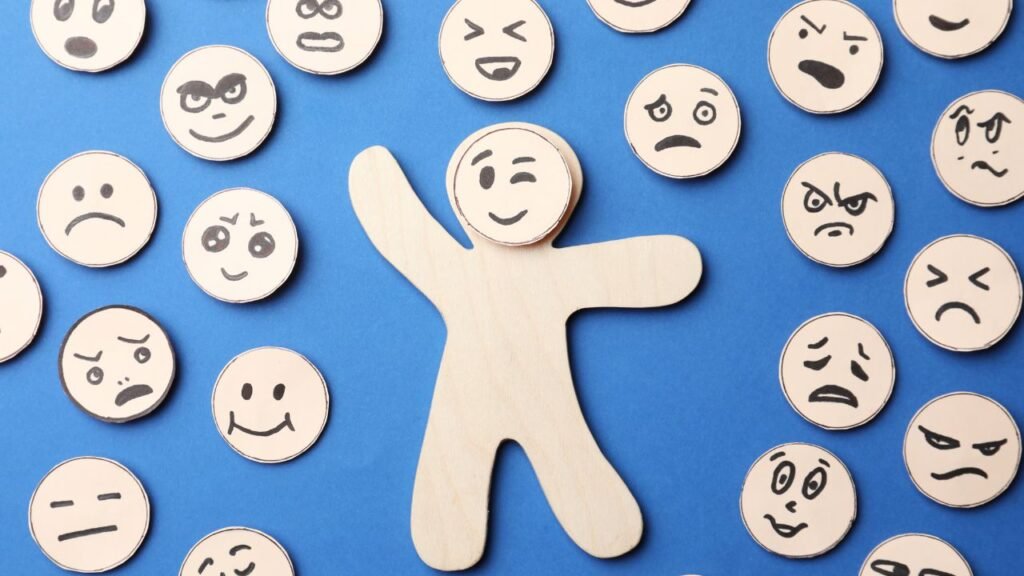Negative emotions are part of being human, something unavoidable in life, which each and every one of us needs to face once in a while. It is the feeling of sorrow, anger, fear, anxiety, or alike, welling up in a person due to events ranging from personal mishaps to serious social issues. Although everybody gets to feel negative emotions from time to time, the truth is that feeling negative most of the time does have a strong impact on one’s mental and physical health, relationships, and even general well-being. Therefore, knowing how to deal with negative feelings, identifying their impacts, and being on the lookout for signs and symptoms are initial steps toward establishing a well-balanced and rewarding life.
What are the Negative Emotions?
Negative emotions are part of human life and include such leading modes as sorrow, anger, fear, and anxiety. Though not very desirable to feel, they still play a significant role in our lives. Sometimes, as a red flag; sometimes, as some kind of incentive for needed changes; and sometimes, just by giving us the opportunity to adjust ourselves to difficulty.
The more we are able to acknowledge and understand these emotions, the more we mend ourselves and cope healthily toward emotional well-being. One should remember that the sense of negative emotions is part of life, which is not at all possible to avoid. We should try to deal with such feelings rather than suppress or look away from them. This approach can lead to personal growth, enhanced resilience, and a deeper understanding of oneself.
Types of Negative Emotions

Negative feelings are those types of emotions that are generally unpleasant or disturbing. Common examples that people usually experience include the following:
Anger: A feeling of frustration, annoyance, or being enraged.
Sadness: It means hopeless, melancholy, or feeling just plain sad. Fear: Feeling anxious, scared, or worried about possible dangers.
Guilt: The feeling of regret or responsibility for some perceived misbehavior Shame:
Feeling embarrassed or humiliated about oneself Envy: Feeling unhappy or resentful toward those possessions, qualities, or successes of another.
Jealousy: State of anxiety or insecurity owing to some perceived threat to a valued relationship or possession.
Anxiety: Generally, it is like an unpleasant feeling of apprehension or unease concerning some uncertainty in the future.
Frustration: Thwarted or discouraged in case some goal is not realized.
Loneliness: Axe isolated or lacking meaningful connections with others.
These emotions differ in intensity and often overlap or coexist in really complex ways.
Effects of Negative Emotions
Physical Health:
Negative emotions can lead to severe damage in students’ physical health. Constant anxiety, stress, and depression may lead to many various kinds of diseases, such as:
Cardiovascular Problems:
Stress and anger have also been related to the rise in blood pressure and heart rate of an individual, which ultimately results in the manifestation of cardiovascular diseases.
Weakened Immunity:
The human immaculate system of immunity can be suppressed by stress, allowing access to various forms of viruses and diseases.
Gastrointestinal Problems:
Anxiety and other forms of stress lead to digestive disorders like IBS and ulcers.
Sleep Problems:
Negative emotions disrupt sleep. One can become insomnia or even sleep poorly.
Relationships
Negative feelings put pressure on relationships with family members, friends, colleagues, and associates in business. Anger and frustration can result in quarrels and miscommunication; constant sadness and anxiety can cause difficulty relating to others and damage proper relationships.
Productivity and Performance

Negative feelings at work impact personal and professional performance. Long-term stress and anxiety negatively influence attention, decision-making, and problem-solving skills, hence reducing efficiency and effectiveness.
Signs and Symptoms of Negative Emotions
Physical Signs
Tension and Pain: Muscle tension, headaches, and body aches are one of the common physical signs that portray stress and anxiety.
Fatigue: If negative emotions are held for a longer time, then they will make a person weary and weak; that is, one will be chronically tired with a lack of energy.
Changes in Appetite: This causes negative feelings that alter eating patterns, either overeating or loss of appetite.
Sleep Changes: Emotional pain will typically manifest in the form of difficulty falling asleep, staying asleep, or having quality sleep.
Emotional Signs
It may display constant feelings of sadness or hopelessness-which is a symptom of depression.
Irritability or Anger: More often than not, irritability or frustration, especially when habitual, can indicate or act as a signal of an inner emotional problem.
Behavioral Signs
Withdrawal from Activities: Interest in regular activities is lost; this could be indicative of depression or anxiety.
Avoidance Behaviors: Negative emotions are avoided through keeping clear of situations or people.
Changes in Everyday Routine: Some of the major changes in everyday habits, including a shift of responsibility and personal care, may be indicative of emotional problems.
Substance Abuse: Reliance on alcohol or other drugs as a means to overcome negative feelings is a sure sign of an inability to cope with the given negative emotions.
Controlling Negative Emotions
Self-Awareness and Mindfulness
Identify and Label Emotions: The correct identification and labeling of negative emotions is a starting point. Knowing what you feel and why will get to the crux of the matter.
Mindfulness Practices: The major ideology of mindfulness refers to a situation whereby an individual learns to be at the present moments without passing judgments or blames. Meditation, deep breathing, and body scans are the activities making one more mindful about herself/himself and helping in the reduction of emotional reactivity.
Cognitive-Behavioral Techniques
Problem-Solving Skills: Learning the path to problem-solving will help deal with the very roots of negative emotions and thus decrease them.
Emotional Regulation Strategies
HРА- Expression: Describe your feelings to someone you trust, like a good friend or a member of your family, or even your therapist. This helps process and vent out the negative feelings.
Healthy Outlets: The actions, hobbies, or creative things one involves themselves in help their emotions to have a healthy outlet.
Building Resilience
Positive Thinking: This kind of attitude and positive focusing on strengths and successes will greatly work on developing resilience against negative thoughts.
Social Support: Building and maintaining strong social relationships brings emotional support, hence decreasing isolation in feelings.
What Are the reasons of Negative Emotions?
Negative emotions can be generated through a range of variables that can readily fall into some discrete broad areas. These are:
Biological Factors:
Genetic background: By the genetic history of mental illnesses of this nature, one is more likely to suffer negative feelings and emotions.
Chronic disease, pain, or fatigue also leads to negative emotions.
Psychological Factors:
Cognitive Patterns: The pathological thinking styles, including catastrophizing, overgeneralization, and rumination, may give rise to negative emotions.
Past Trauma: Trauma or abuse meted out in the past can have long-term effects on emotional health.
Low Self-Esteem: Having a poor image of oneself and holding low self-worth engenders feelings of sorrow, anxiety, and anger.
Stress: High levels of stress coming from every quarter can lead to negative emotional states.
Social Factors:
Relationship Problems: Conflicts, separation, or problems with family, friends, or partners lead to feelings of bad emotions.
Social Isolation: Lack of social support or feeling disconnected from others leads to feelings of loneliness and eventually depression.
Peer Pressure: Conforming to social norms or expectations results in stress and anxiety.
Environmental Factors:
Bad Living Conditions: Overcrowding, noise, lack of personal space result in decreased emotional well-being.
Work Environment: Job stress, lack of job security, or a toxic work environment can all contribute to negative emotions.
Financial Stress: Clearly, economic hardships, debt-traps, or financial instability is very likely to cause an individual anxiety and depression.
Life Events:
Loss: Death of a loved one, loss of job, or break up of a long-term relationship ends with immense sadness and feelings of grief.
Transitions: Any form of change in sets, whether it be moving into a new city, changing jobs, or probably becoming a parent, are stressful and therefore bad.
Cultural and Social Factors:
Cultural Expectations: Cultural expectations and norms can affect how emotions are expressed and perceived Influence of Media one gets exposed to bad news, social media comparisons, and societal pressure which comes down hard on one’s emotional well-being.
Knowing these causes would enable a person to avoid sources of negative feelings and be more capable of controlling his or her emotions and having improved mental well-being.
How to come Over Negative Emotions
There are different ways of handling negative emotions. Some of these are given below:
Identify and Acknowledge Your Feelings
Identify Your Emotion: Do you know what you feel? Naming your feelings helps in understanding them better.
Accept Your Emotions: It is normal to have a negative feeling; one need not avoid it or suppress it. Indeed, avoidance or suppression often aggravates it.
Meditation: Regular meditation might contribute to more calm and emotional balance.
Healthy Coping Mechanisms
Exercise: Exercise will help decrease stress and mood upliftment.
Creative outlets: Drawing, writing, or playing music are various fields of activities YOU express your emotions through.
Social Support: Share what’s going on with your friends, family, or therapist.
Challenge Negative Thoughts
Cognitive Restructuring: In your thoughts, identify a negative pattern of thinking and challenge it. Replace them with more balanced positive thoughts.
Gratitude Practice: Pay attention to things you are grateful for. By doing so, one’s mind will be changed and will turn positive.
Seek Professional Help
Therapy: A mental health professional can give you individually-tailored advice and a plan.
Medication: If you feel the symptoms of depression or anxiety, take medication to bring those symptoms under control.
Do Pleasant Activities
Hobbies: Do things that bring you pleasure.
Volunteering: Helping others gives a person a better mood and purpose.
Take Care of Yourself
Social media: Spend less time on social media to experience less negative emotions from the internet.
Environment: Bring yourself around people who will introduce positivity into your life and participate in positive activities.
Learning from Experience
Reflect: Reflect over experiences and what they can teach about life.
Resilience: Build resilience by looking at any obstacle in life as an opportunity for growth.
All these strategies would, when practiced, raise, manage, and overcome the negative emotional state to health and emotional balance.
Final thoughts:
Control of negative emotions is very significant for both mental and physical health. This will include effects on their health, relationships, and productivity. A basic principle of dealing with these emotions, such as anger, sadness, and anxiety, entails the ability to acknowledge the warning signs or symptoms of their continuing rise, which can be manifested in an individual through aspects such as irritability, mood swings, fatigue, physical discomfort, and even withdrawal from social interactions.
Various strategies used in controlling or dealing with negative emotions. These techniques include mindfulness practices, notably meditation and deep-breathing, geared toward focusing one’s mind and driving out dross from stress. Other cognitive-behavioral techniques include clear workable tools like reframing thoughts and challenging irrational beliefs. This is further buttressed by physical activity, good sleep, and proper diet as contributors to emotional regulation through improved overall physical health. Further, support from friends, family, or perhaps professional mental health may provide additional interventions and perspectives that could help to better contain negative emotions.


